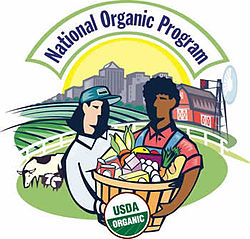

Organic certification is a certification process for producers of organic food and other organic agricultural products.[1] In general, any business directly involved in food production can be certified, including seed suppliers, farmers, food processors, retailers and restaurants. A lesser known counterpart is certification for organic textiles (or organic clothing) that includes certification of textile products made from organically grown fibres.
Requirements vary from country to country (List of countries with organic agriculture regulation), and generally involve a set of production standards for growing, storage, processing, packaging and shipping that include:
- avoidance of synthetic chemical inputs (e.g. fertilizer, pesticides, antibiotics, food additives), irradiation, and the use of sewage sludge;[2]
- avoidance of genetically modified seed;
- use of farmland that has been free from prohibited chemical inputs for a number of years (often, three or more);
- for livestock, adhering to specific requirements for feed, housing, and breeding;
- keeping detailed written production and sales records (audit trail);
- maintaining strict physical separation of organic products from non-certified products;
- undergoing periodic on-site inspections.
In some countries, certification is overseen by the government, and commercial use of the term organic is legally restricted. Certified organic producers are also subject to the same agricultural, food safety and other government regulations that apply to non-certified producers.
Certified organic foods are not necessarily pesticide-free, as certain pesticides are allowed.[3]
- ^ Labelling, article 30 of Regulation (EU) 2018/848 of the European Parliament and of the Council of 30 May 2018 on organic production and labelling of organic products and repealing Council Regulation (EC) No 834/2007.
- ^ "Organic Farming". United States Environmental Protection Agency. Archived from the original on June 24, 2003. Retrieved May 30, 2023.
- ^ "Pestcides in Organic Farming". University of California, Berkeley. Retrieved 2014-06-17.
Organic foods are not necessarily pesticide-free. Organic foods are produced using only certain pesticides with specific ingredients. Organic pesticides tend to have natural substances like soaps, lime sulfur and hydrogen peroxide as ingredients. Not all natural substances are allowed in organic agriculture; some chemicals like arsenic, strychnine and tobacco dust (nicotine sulfate) are prohibited. ...